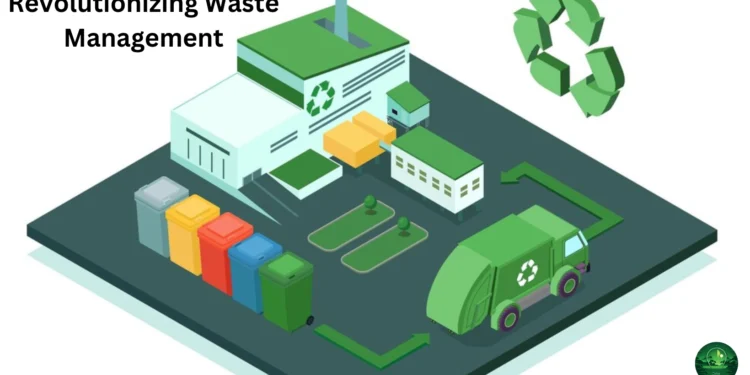Last Updated on December 15, 2023 by Flavia Calina
Waste management is an essential industry. It minimizes greenhouse emissions and helps conserve resources.
The future of waste management is bright, with new trends and predictions shaping the industry. These include data-driven decision-making, a focus on sustainability, and technological advancements!
These innovations could improve efficiency, reduce costs, and boost resource recovery.
Data-Driven Decision-Making
Data-driven decision-making is critical in waste management, as it empowers organizations to make informed choices in reducing waste and maximizing resource recovery. It also assists businesses in adhering to rules and making a positive impact on a more sustainable future.
New waste management technology is revolutionizing waste management by enabling companies to collect real-time data on waste streams. For example, smart trash bins can automatically communicate data on container filling levels and fire or clogging alerts via IoT networks to a cloud platform. This enables waste management companies to optimize collection routes and schedules.
Recycling systems that transform plastics, for example, into new materials that can be utilized to build more sustainable products are examples of additional IoT waste management technology. These technologies reduce the amount of waste in landfills, reduce greenhouse gas emissions, and support a transition to a low-carbon economy. These technological advancements boost a company’s profitability while assisting it in meeting its environmental objectives.
Smart Technology
Incorporating smart technology into waste management processes streamlines them, improves sustainability, and makes them more cost-effective. These technologies range from sensors that monitor trash levels to smart weighing mechanisms in garbage trucks, which help mitigate collection costs and avoid half-full bins.
For example, a smart trash can with an image sensor that recognizes a certain type of item and triggers compaction reduces waste by up to 5-8 times. These receptacles also eliminate the need for centralized waste disposal locations and can be emptied at the source.
Other technologies, such as plasma gasification, turn waste into sustainable energy by heating it at high temperatures to generate hydrogen gas and a glass-like substance. This helps reduce carbon emissions and keeps trash out of landfills.
Other tech-based waste solutions include smart containers allowing point-to-point pickups and optimizing routes to reduce environmental impact, traffic congestion, and fuel consumption. These tools and data analytics can increase recycling rates, create more efficient processes, and encourage citizens to contribute positively to waste management initiatives. Embedding these technological solutions into waste management practices saves communities money, reduces greenhouse gas emissions, and contributes to a healthier environment.
Autonomous Vehicles and Robotics
Using robotics in waste management helps optimize recycling programs and reduce the amount of waste in landfills. It also increases the efficiency of sorting and collection, allowing companies to cut labor costs.
Global trash creation has increased due to rapid urbanization and population growth. Unfortunately, 33% of solid waste is improperly disposed of and can cause environmental harm, such as groundwater contamination, land degradation, and poor air quality.
Waste disposal robots are a new technology that can help to solve this problem by monitoring trash sites and sorting materials. By automating the process, they can help to ensure that only recyclables are disposed of and prevent hazardous materials from being thrown away.
In addition, robotics can improve recycling and recovery systems within production facilities. This will help reduce the amount of discarded materials that can be reused, leading to a greener future.
Circular Economy Principles
Ideally, waste management strategies are designed to prevent waste generation in the first place. These are often achieved through environmentally conscious manufacturing techniques, leakage detection systems in material storage, innovative chemical neutralization technologies for reducing reactivity or water-saving technologies that reduce the need for freshwater inputs.
In addition, companies are also implementing circular waste management practices that aim to reduce the generation of residual and household waste and to incorporate waste back into the production process. This can be accomplished through eco-design, repair, extending the life of products, reusing or recycling, and converting waste to energy such as renewable diesel or sustainable aviation fuel (SAF).
To achieve this, waste collection technologies are getting smarter as well. Sensors are being built into bins that detect when they are full, which helps to optimize waste collection and minimize the number of trips needed to empty trash, recycle, or compost bins. Some cities are experimenting with self-driving garbage trucks that can collect trash and other materials without human intervention, cutting labor costs and reducing fuel usage.
Sustainable Practices
Sustainable waste management practices include reducing waste and promoting recycling and reuse. This reduces the amount of waste produced and helps to cut disposal costs while minimizing environmental impact. Many cities and countries offer tax incentives to encourage sustainable waste management.
Smart waste collection systems are utilizing sensors to monitor bin fill levels and automatically trigger alerts for collection, which cuts fuel usage and greenhouse gas emissions. Advanced technology is also making it easier to sort and recycle.
Some cities even aim for zero waste; very little to no waste is sent to landfills. This is made possible with innovative recycling and waste-to-energy solutions. For instance, converting paper into renewable energy eliminates the need to clear natural forests for pine plantations and conserves ecosystems. It also saves energy, as producing one ton of paper requires a lot of water and oil. Read more exciting articles on Today World Info











